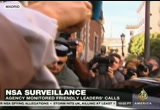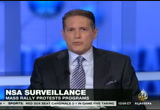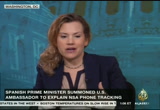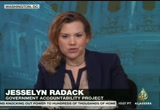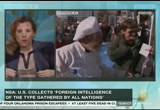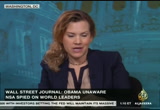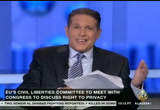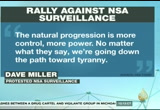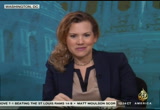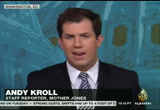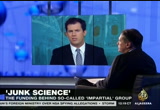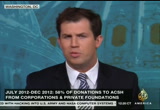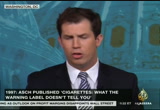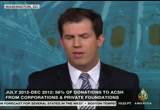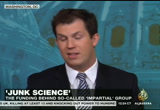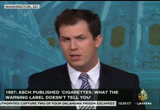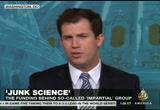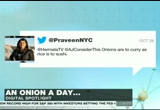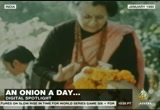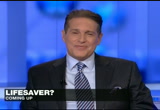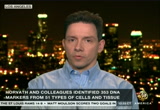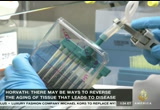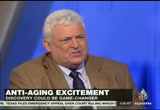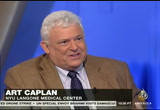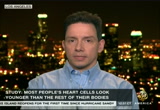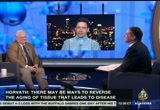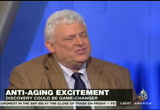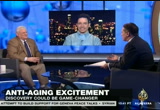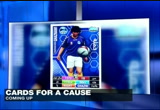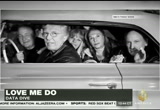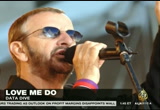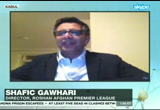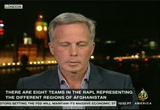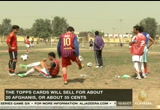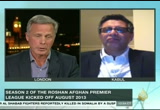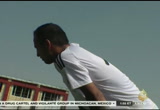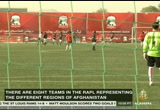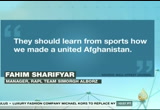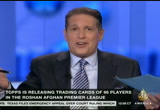tv Consider This Al Jazeera October 29, 2013 1:00am-2:01am EDT
1:01 am
1:02 am
real costs of our spying operations. also, is there a way to slow the aging process? a new discovery has thrilled the medical community. what are the real complications involved -- implications. >> can trading cards in soccer bring peace? afghanistan. >> i am antonio mora. we begin with the latest in the nsa controversy. ambassador to spain, james costas it was called after reports of 60 medical spanish phone calls. >> the european union met behind closed doors. german parliamentians would like to know why they tapped chancellor angela merkel's phone calls. >> we are not considering our chancellor as a terrorist. therefore, i would say they have
1:03 am
1:04 am
ability to bulk collect phone records and restrict who it can spy on. >> fighting in syria blocked u.n. inspectors from access to two chemical weapons facilities, a setback in an attempt to rid syria of chemical weapons. inspectors did not say whether the syrian rebels or the government was responsible for the delay. negotiations for access are under way. abortion right supporters in texas are celebrating a legal victory after a judge found provisions of the abortion law unconstitutional, ruling that the measure restricted a woman's action to abortion clinics. the government will continue efforts. >> penn state university is paying $60 million to 26 young
1:05 am
men abused by a lecturure. it comes a little more than a year after jerry sandusky was put in gaol for 45 counts of the child abuse. "consider this" is up next. you gone go to aljazeera.com for the latest news. balance. given the threat america continues to face, shouldn't these programs go forward with some oversight? >> these programs, we don't even begin to know the depth of them. we are scratching the surface right now. and i can tell you that from
1:06 am
representing whistleblowers for years. these violate numerous national laws as well as international laws. so i don't know if it's a matter of modifying them. i think you may not have heard the level of outrage from spain that you did because you didn't hear about the head of the state employing monitored. initially, germany had a rather soft reaction to the idea its citizens were being monitored but then when angela merkel found out she was being monitored, she was furious. i am not sure why we are monitoring. historically, i agree that intelligence agencies and embassies of other states monitor each other all the time. i don't think anyone has a problem request that buzz when you are monitoring a entirely innocent population and the head of state for that particular country, that seems
1:07 am
like a breadth of surveillance that has no historical precedent. >> they say we weren't really listening to the phone calls of all of these citizens. it was the meta data argument that they are keeping drag of whom is calling whom. citizens in spain could be connect with people in pakistan, could be connecting with people in the united states and that might give us a trail to find some terrorists. >> well, first of all, meta data tells you a lot more about what people are doing than content. i know that may seem counter-intuitive but you get a lot more information from meta data. and the question is, if they are having conversations with someone in pakistan, i mean i have no problem with following law enforcement procedures if you think people are engaged in a crime. obviously, the law -- the law contemplates that. what it does not contemplate is blanket,
1:08 am
dragnet mass surveillance with no oversight of millions and millions of people it's just outrageous. in. >> what's the main message you wanted to get out of saturday's rally? what would you like it to do to forward? >> i think saturday's rally was meant to say that, look, people in the u.s. of every political stripe and every background are all in favor of reining in the surveillance state we have created. while there are bills that we want congress to realize we are watching and we do care about what's going on, and they need to mpay more attention to their constituents than to thursday their corporations and other people who are sponsoring them. >> the issue does seem to be succeeding in pulling people from both sides of the aisle
1:09 am
1:10 am
liberal person was attacking me because they were an obamabot and indented to obama and wanted to defend anything and everything obama did. but i know for sure, obviously, as george bush had been doing this, democrats would have been all over it. i think in america, we are in this reallinique situation where a lot of t he people who would ordinarily be angry about this are too busy drinking the kool-aid from the obama fountain to look at it rationally. >> talking about the obama administration, a senior
1:11 am
administration official told the "new york times," a quote, it's not that the nsa or the intelligence community were going rogue or operating out of bounds. is that the issue here that other countries spy on the u.s. to the degree their technology allows? and isn't that, in fact, what the nsa did? they just simply did business as usual? >> they are going rogue and out of bounds because they are violating section 215 of the patriot act and section 702 of the fisa amendments act as well as the fourth amendment of the constitution. and as i said earlier, i get it. embassies spy on embassies and intelligence groups spy on one another. but we don't spy on innocent, perfectly innocent citizenship, an entire populace of a nation as well as the high level conversations of the actual leader's hand-held device. >> if that broad monitoring of population ended up finding terrorist plots, how would you respond to that? >> again it would be an ends-justify-the-means argument i don't buy. eventually we were able to find
1:12 am
outed who the tsarnev brothers were because we basically crowd sourced a manhunt for surveillance scammers and people's picture cameras and iphones. just because we found that doesn't mean that surveillance works. it's an ends-justifies-the-means. the obvious point was that they did have hundreds of government surveillance cameras in boston that did not detect, alert, or stop the point. >> i guess the argument would be on the other side that it could at some point, and whether you would want it for those cases where it might happen, but move move on and talk about edward snowden. does he consider himself a hero as supporters do. how does he react to the anger of those who call him a traitor? >> i think he is disappointed. he doesn't consider himself a hero.
1:13 am
i think he eschews any such label. i think he considers himself a patriot and an american and a whistleblower. and i think that's right. obviously all sorts of incendiary and inflammatory words have been thrown around, some of which don't even fit the legal definition, if people were to bother to look it up. but, no, he didn't see himself as a hero. >> one of the people attending the rally, a man named dave miller, told u.s.a. today, the national progress is more control, more power. no matter what they say, we're going down the path towardteri ttierney? do you agree? >> i think we are in the position of turnkey tierney. we are right there. we are following the playbook. >> how has it hurt anybody? >> how has it hurt anybody? the fact that all of our personal information is being stored in a big data storage
1:14 am
facility in utah, anybody at any time who works for the nsa or any one of these other contractors could decide they don't like you or they want to find out more about their ex-wife or they just would like to know more about this person or maybe they are stalking another person and dig down on that information. it's extremely dangerous thing. even worse, our enemies could easily dig into that trove of information that we have created on everybody. it's very harmful. it's completely unnecessary, and it obviously has had nothing to do with stopping terrorism. >> jesselyn radack, we thank you thoughts. >> thank you. coming up: how much can you trust new studies and reports about your wellbeing. are groups you thought consumer advocates a front for special interests or big corporations? plus our social media producer is tracking the most interesting stories on the web. what's trending?
1:15 am
>> today's story illustrates the power of onions. they might make you cry but in some countries, they can help decide elections. more on that coming up. >> what do you think? join the conversation on twit r twitter @ajconsiderthis. >> every morning from 6 to 10am al jazeera america brings you more us and global news than any other american news channel. find out what happened and what to expect. >> start every morning, every day, 6am to 10 eastern with al jazeera america.
1:30 am
together unexpected voices closest to the story, invite hard-hitting debate and desenting views and always explore issues relevant to you. determining using some sort of subjective interpretation of their policy as to whether or not your particular report was actually abusive, because if it doesn't contain language that specifically threatens you directly or is targeted towards you specifically, they may not consider it abuse. they may consider it offensive. and in that case they just recommend that you block that person. >> i don't want to minimise this, because i mean, there's some really horrible things that are on line, and it's not - it's not just twitter, what has happened through social media and the anonymity of the net is
1:31 am
that you see websites, hate-filled websites targetting all sorts of groups, popping up. there has been a huge number of those that exist as well. all next week america tonight investigates the campus rape crisis. >> serial rape is the norm on college campuses. >> i know that when i did report, i was blamed. >> then this friday at nine eastern, we open up the conversation in a live town-hall event. sex crimes on campus, a special week of coverage and live town-hall on america tonight nine eastern. only on al jazeera america. what if you could slow the a. >> cla professor says he found an internal body clock, thanks to dna that tracks the biological age of our body's tissues and organs. researchers say there are some that age quicker or slower than others and that discovery could
1:32 am
unlock secrets that could help you see young -- could help keep you young. it could also help target disease that come in old age. what could this mean for potential cures? and what are the ethics involved? dr. steve horvath is a professor of human genetics at ucla. he joins us from los angeles. dr. art kaplan is a bioeth cyst. he is the head of the nyulangon medical elth ifex division. dr. harvath, i want to speak with you. you have spoken about a fountain of youth since ponce de leon went searching. we know you studied 8,000 samples of more than 4,000 cancerous cells and tissues. give us a shot in layman's terms here what exactly did you find? >> well, i found a biological clock that allows one to
1:33 am
estimate the ages of many tissues and cell types in organs in the human body. and this new aging clock is based on certain markers on the dna, and by averaging these 353 markers, one can arrive at a highly accurate estimate of human age. >> so you can actually see what the dna, what age the dna should have. you can see where some were older and some were younger? >> yes. exactly. this is, of course, a very interesting application to estimate the age of various different regions from the same individual and then identify certain tissues or organs that either look substantially older or younger based upon their
1:34 am
chronological age. >> i want to talk about what you younger. i also want to talk about a very important thing that you found, that there was a way of resetting adult cells into what you call plury post he want stem cells so you can turn back the clock on those cells. what potential does that hold for anti-aginging? i need to be sure i have not found a way to rejuvenate tissue. we are far from that. but what i have found is that a 3r0er that is reroutinely used to turn mature cells into almost embree embryonic soles, this resets the aging clock to zero and, in other words, it resets the age of the adult tissue back
1:35 am
to an almost embryonic state. >> dr. kaplan, there has been a lot of study of stem cells as possibly anti-aging cures. do they bring up any ethical issues for you? >> enormous ethical issues. but let me say this discovery, the ability to sort of see what the biological clock is, organ by organ, traumatic brain injury by tissue, demonstrating that, in fact, our bodies age at different raises inside ourselves, that's really important. i know some viewers may say if you can't reset my clock, what do you care? call me you can when i can be rejuvenated but this is major stuff because it allows us to say, hey, maybe you are going to need an organ trans plant if your liver is aging particularly rapidly or if a cancer is near tissue and that looks abnormally older. dr. harvath has a great breakthrough here? >> thank you. >> stem cells are very, very exciting. we don't know how to do this rejuvenation with them yet. we are trying to do research
1:36 am
with them but probably the biggest question they raise is: if you could rejuvenate, you have to be thinking, look, it better be my entire cell system because you don't want to be in situations where your body is rejuvenated and your head is not or your brain is lagging and your liver is good. that's probably the biggest challenge is figuring out how to change everything. >> inevitably when things like this come up, people always say, well, should we be doing this? >> yes. >> are we playing god? >> you know, you do hear that. and i have to say in a world in which modern medicine replaces organize appears a and most ofr us are familiar william artificial limbs and like dick cheney, an art official heart. we have not going to be limited by, if you will, the way nature s i think there are still questions: should we do certain things? should we not do other things because they cost too much? the general idea that we shouldn't try to improve change or even alter our life span, i don't see the argument. >> dr. harvath, let's talk some
1:37 am
more about what you found. again, we were talking about how certain things seem to age at different speeds. what is aging too quickly and what is staying younger? >> yes, before i directly answer that, let me mention that the exciting aspect of this cl clock is that most tissues have the same age as expected. however, i found evidence that two tissues show a discrepancy. a human heart tissue appears to be substantially younger than expected. for example, the heart of a 50-year-old man could be 10 years younger than expected. and similarly, i found evidence that female breast tissue expected. >> why? >> i really don't know and this is clearly a very excited question because if we understand what ages these
1:38 am
tissues or what prevents aging, then we are a step closer to understanding why we age. one of the things is chronological aging versus biological aging of an actual human being, compared to going to your high school reunion and you see people who look 10 years older than and others that look 10 years younger. could it be that those people who have those older looks, it's because their dna is terrible? >> well, it could be, but i would think that it has a lot to do with lifestyle decisions effect. >> maybe some cosmetics, too. >> yeah. >> a little surgery. >> could it be partially dna? >> yes. it could be. but i expect the effect is rather small.
1:39 am
what we really need is a large studies, large cohort studies to investigate whether we can detect an effect between accelerated aging on the one hand and for example, age-related diseases and other age-related complications. >> you have looked, dr. caplan at anti-aging in the past from an ethical standpoint. where do you think we will go over the next 10 to 20 years? >> there are two interesting questions about anti-aging. one is: can we get everybody to live what we would now consider a normal life span? say make it to 90. a lot of us don't. maybe technologies like this one will start to open the door so that more of us can live to an older age. then there is life extension. what can we do maybe to reset the clock, live to 110, 120. i think the big ethical problem is going to be where do you put your chips? are you going to try to let more people all around the world live
1:40 am
to a full life span, or are you going to say, well, if you are rich enough or in a privileged society, maybe you will get the life extension. >> choices about where to put the resources exactly. i think that will be a big battle in the year to come, this technology we are hearing about tonight begins to improve. >> a viewer question. let's go to hermela for that? >> dr. harvath, viewer stewart wants to know does this have any implications on degenerative illnesses like alzheimer's? >> well, it would be wonderful if we could find a relationship between age acceleration and brain tissue, for example and alzheimer's status. but unfortunately, i don't have any data that would the support in t this claim. but of course, i hope that many of my colleagues will look at that because this kind of data is already out there and i distribute, freely available
1:41 am
software on my web page. so, it should be very straightforward to address these questions. >> one fun thing you bring up is that there are actually potential implications from your research to fight crime? >> yes. many people suggest to me that this age predictor could be used to doctor -- for forensic applications, if blood is left on a crime scene, one could apply these age predictors to at least estimate the range of the age of the perpetrator. >> i new this was true, everything boils down to csi, no matter what you do? >> we only have about 30 seconds. implications. do you think that will be a big deal going forward as to how much money can be put bo this? >> i do. you have one issue rights in front of us. how much do we devote to anti-aging when a lot of people can't get basic healthcare.
1:42 am
we are watching that debate. how hard do you try to extend life for the normal life span? what do you want to put into the making it longer. tough questions. questions. >> it's a fascinating study, incredible findings. dr. harvath and dr. caplan, great to have you here to talk about this. >> thank you so. >> please keep us posted on where you go next. a lot of us will be curious about where you go. next, how are john, paul, george and ringo still one of the biggest draws in the world more than 40 years after their last concert? find out why today. we will ted tell you how trading cards are offering much more than a favorite player and bubble gum. they could lead to a small measure of peace in one of the most war-torn nations in the world. afghanistan. what happens when social media uncovers unheard, fascinating news stories? >> they share it on the stream.
1:43 am
>> social media isn't an after-thought, it drives discussion across america. >> al jazeera america's social media community, on tv and online. >> this is your outlet for those conversations. >> post, upload and interact. >> every night share undiscovered stories. super storm sandy and the effects it still has on americans. >> we do not wanna let sandy dictate our lives., and we never will...
1:44 am
>> surviving sandy, one year later... tomorrow 7 am - easten on al jazeera america today's data dive gets a ticket to ride on the bandwagon that is beatlemaniai. in 1964, ringo starr is thatted this photo. the beatle's drummer put out a tour to find the fans for a new book called photography. as the same goes, star recreated the shot with a little help from his friends at the today's show, those fans who skipped school to see the band are in their 60s. bob to thet was suspended three days to truancy. the head master finally admitted skipping school for the lads from liverpool was a good idea. beatlemania is sleeve and well even two band members aren't. they are the best selling band
1:45 am
in history with more billboard hits than any other. incredibly, they continue to be hot today, 43 years after they broke up. only five acts have been able to sell as much music in britain this century as the beatles. the fab four saying you never give me your money. you only give me your funny paper. i am not sure what they were talking about because they grossed $71 million just this past year. paul mccartney made 47 million, largely thanks to solo giggs and publishing rights to a gone but not forgotten star bud d.c. holingly. john lennon's estate grossed $12 million. ringo tours with his band and earns about $400,000 a night, 10% of what sir paul gets. $6 million he earned last year. george harrison made about the same even though he died about 12 years ago. his song writing credit for here comes the
1:46 am
sun. cirque du soleil gives the banda chunk of money, too. then there are the tribute bands. each red line you see is a listing for a beatles cover band in cities across america. >> that's not to mention all of the international ones. with that manitributes, a real beatles fan could go see their favorite hits live by a week. coming up: can trading cards depicting afghanistan's boast athletes unite a nation torn apart by war? this is the 900-page document we call obamacare. my staff has read the entire thing. can congress say the same? millions who need assistance now. we appreciate you spending time with us tonight.
1:47 am
1:48 am
soccer has a unique power among sports. it can rous national passes for better or worse in a way few other things can. in 1914, soldiers took a break from killing each other in world war i and, instead, played soccer. on the other hand in 1969, he will salvador and hon dueras went to war and it went into
1:49 am
outright conflict. in january as a group o italian group hurled chants, the home team walked off with the visitors in solidarity. in afghanistan in 2012, a reality t.v. show helped create the teams for the first national professional soccer league in hopes of healing the wounds caused by decades of war, occupation, sectarian violence and poverty. and this year, in a nation whose heroes are more likely to be holding an ak-47 than a soccer ball, the topps company is create agnew generation of her odes by releasing a set of 96 trading cards featuring the players in the premier league. here to talk to us about the amazing impact the sport of soccer can ahave, we are joined from kabul afghanistan by one of
1:50 am
the commissioners of the roshan league and by chris rodman of topps europe. i thank you both very much for joining us tonight. shafiq, i would like for you to respond to a quote from a university student in kabul. he said, i am so lucky to be sitting here and watching my country's football league. it feels like i am watching barcelona play real madrid. i know that sounds like exaggeration but who would believe we would see something like this in afghanistan one day. as a former soccer player, yourself and a commissioner on the premier league, what does the league and the sport, itself, mean to afghanistan? >> greetings from kabul, and it's my belief that football is one of the most powerful platforms to unify people and the statement of the younger students is proof for it. we manage the ball to unify the communities and to show a positive picture from afghanistan to the rest of the world and at the same time, make
1:51 am
the younger generation hopeful for a better future. >> now, you've got soccer matches being played in some stadiums where people used to be killed and punished by the taliban? >> we are not playing where bad things happen. we build a new stadium, a smaller one we are playing there. >> you said we only have heroes from the war. we don't have musicians or artists or sportsmen as heroes. how much of an impact do you see with the league? and having trading cards help you o what kind of impact do you think that will have on the young cavity generation of afghans? >> a corporation between topps
1:52 am
and afghanistan premier league, we are willing to introduce new heroes for the country, for the nation and topps is a good way to achieve this goal. i am hopeful for the future. we have already introduced more than 180 heroes around the country, all of the players coming from different provinces and everybody knows them. the topps cards will help them people. >> it will be great to have positive role models. how did topps get involved with the after gallon premier league? you are a big company. you have big -- a lot of activity all over the world. how did you end up in afghanistan? especially under these terrible circumstances that that country has been going
1:53 am
through? >> it was introduced by icener and topps' ceo to engage and exciting young afghan is with league. >> how do you see this working from a business standpoint? you really only have 96 players right now. how much of a market do you expect to find in afghanistan for these trading cards? >> well, when you look at the passion for the sport and the youngsters, there is enormous a lot of potential. soccer players all over the world real aspirational characters for children who collect topps products and can provide positive role modelses for those children and, perhaps, influence some of the choices they make in their life, whether that's not doing drugs or studying more at school. we are hoping that by
1:54 am
taking and raising the awareness, we might be able to help in some of those very worthwhile areas. >> is this almost a pro bono thing for topps? because the cards are $0.35. that's cheap by american standards. in 2010, the average income in afghanistan was $426. that means they were only making average. so $0.35 is a lot of money. >> yes, it is amount of money. but relative to some of the other things that can be purchased in the market with deposable income, it's priced competitively. as you rightly say, it is a fraction of the price of the product we sell in america or here in the u.k. with our english premier league product. it works out as about a 5th of the price. it is priced to try to engage as many children as possible and our business is all about exciting kids and getting them passionate about the sport and so, therefore, there is a
1:55 am
combination of some product that he has purchased and some that's given away and some that's used as promotional activities with sponsors like roshan. >> shafiq, tell me about the sectarian violence that continues in afghanistan. in talking about the league, you said that we would like to bring our message to the majority of after gans and to the world, that afghans can play together and that we have teams composed of different tribes, of different ethnicities. if you look at the kandahar team, they are not just only composed of pastoons, but other ethnicities, too. the idea of sectarian violence is foreign to most americans. so how is it that soccer can manage to heal these old wounds, animosity that has been passed from generation to generation? >> first of all, there is no afghanistan. >> that's also a picture that we would like to fix it. and these
1:56 am
game shows that is proof for it t i think afghanistan is a young nation. we have the overwhelming majority of the position is under 25. 25%, and that is our target group and the people who have the passion for sports, especially for ball, and due to the war and civil war, they haven't got the chance to come together and to make peace with each other. football brings it mossim, bringing all of the countplayer around the country, for one and a half to two months together. they are changing their views, also, their time with each other. they are making friends among each other. and that has a factor for the rest of young people and if they are back in their provinces, they have
1:57 am
a lot of nice things about their friends in the from the north, from the south, from central afghanistan and other areas. and i say to many ofmize, we have proved after gans can compete and go for fair competition and, also, at the hand of the -- end of the day, shake hand and come together and share their nice stories with each other. >> that's what we are -- what we wanted to achieved. >> the violence now is mostly generated from the taliban. there is certainly a longshift of sectarian violence. you had war lords all over the country. now, the manager of the albor phoenix from the northwest has spoken how the sport has brought the nation together politicia politicians have not and say they should learn from sports how we make a united afghanistan. you have been quoted as saying similar things. what message can soccer bring to
1:58 am
afghanistan? >> key wo--? >> teamwork. >> an important move for topps to get into a country like this. what do you hope topps can help do in afghanistan? >> i hope in a small way that kids around the rest of the world have when they are looking to find their sporting heroes in a packet of topps cards and in the process, maybe it will be a cause for good social interaction between different communities in the country. >> shafic, to end, soccer leagues fail all over the world. other sports leagues fail all over the world in places that aren't phasing the -- facing the kind of violence that exists in afghanistan. what do you hope to see for the league's future. are you confident the premier league will survive and thrive?
1:59 am
>> i am optimistic and the concept we have used and also now, everybody sees that the cooperation between the private sector and afghan football federation on one side and from public sector is join -- that these all sectors join hands is a very good concept to make the league's obtainable and we are very hopeful that it would be future. >> we certainly wish you the greatest possible success and same to you, chris, for your efforts there. shafiq, and chris rodman of topps international, thank you for your time. the show may be over but the conversation continues on our website, aljazeera.com/considerthis, or on our facebook or google plus pages. we will see you next time.
2:00 am
a victory in texas for abortion rights supporters. a federal judge shutdown a key part of a restrictive abortion law that was set to go in to effect in the state on tuesday. embroiled in an embarrassing spying scanneddal president obama may order the nsa to stop eavesdropping on the leaders of american allies. this has congress considers legislation that would strip the agency of some of its powers i've settlement deal for jerry sandusky's victims, penn state agrees to pay out nearly $60 million to the 26 mena beused by the former assistant football coach. and one year later, remembering hurricane sandy. the super storm was one of the most damaging and one of the most expensive stormso
105 Views
Uploaded by TV Archive on

 Live Music Archive
Live Music Archive Librivox Free Audio
Librivox Free Audio Metropolitan Museum
Metropolitan Museum Cleveland Museum of Art
Cleveland Museum of Art Internet Arcade
Internet Arcade Console Living Room
Console Living Room Books to Borrow
Books to Borrow Open Library
Open Library TV News
TV News Understanding 9/11
Understanding 9/11


